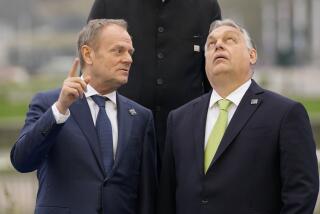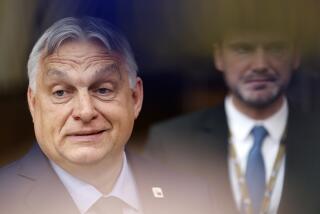One Europe: The Dream of Unity : Regional Outlook : ‘Silver Curtain’ Latest Barrier Separating East, West : Decades of neglect have left the economies of former Warsaw Pact countries unable to compete with their continental neighbors.
BUDAPEST, Hungary — The pistachio-green telephone on Karoly Soos’ desk goes a long way in explaining why the emerging democracies of Eastern Europe cannot yet bond in economic brotherhood with the West.
The typewriter-sized monstrosity has 10 black switches, nine white buttons, eight blinking red lights and three levers, but neither it nor the hundreds of other desktop dinosaurs like it at Hungarian parliamentary headquarters is capable of making a long-distance call.
“Imagine that we are part of the European Community and we can’t even call a colleague abroad,” said an exasperated Soos, a member of Parliament and chairman of its Budget Committee. “There are just too many things that show we are insufficient to be part of the EC.”
Politicians and economists call them “infrastructure problems,” but ordinary people know them as potholed roads, unreliable telephones, bank transfers that take a month and harrowing air and train travel.
All of Eastern Europe suffers from a chronic lack of infrastructure and services compatible with the developed Western democracies with which they would like to merge.
The former Communist countries also endure at least double-digit inflation and rising unemployment, and their currencies cannot be converted for deutschemarks or any other legal tender in the 12-nation EC.
It is these deficiencies that have built a new wall on the traces of a dismantled Iron Curtain, locking out the aspiring capitalists of Eastern Europe from 1992’s economic unification of the West.
Some opinion makers in the countries being excluded from the established rich nations’ club fear they are being unfairly punished for having been enslaved by Communist dictators for 40 years. Polish President Lech Walesa has complained that Europe is now divided by a “Silver Curtain” that separates the nations into camps of the haves and have-nots.
But others seem to trust Western leaders’ assurances that the new economic union will build bridges rather than barriers. Government ministers and economists in the three Central European states recovering fastest from Communist ruination contend their continental neighbors will welcome them as soon as they are trim enough to fit through the door.
Hungary, Czechoslovakia and Poland earned associate-member status late last year, gaining entry to the lucrative unified EC market for some of the food and consumer goods they produce.
That interim step has cushioned what could have been a knockout blow to their staggering economies. All three countries are struggling through transitions to free-market capitalism, exacting painful sacrifices from workers and consumers.
Bulgaria, Romania, Albania and some of the fragmented remains of Yugoslavia and the Soviet Union are expected to seek associate EC membership later. Slovenia and Ukraine are given the best chances of meeting EC terms for association this decade. But the others suffer continuing political turmoil that is delaying economic transformation, depriving them of even limited trade within the EC market.
Exclusion from full economic integration means that trade goods from the former Communist region are saddled with prohibitive tariffs, making them more expensive for Western consumers even though they are produced at lower cost.
A World Bank study last year estimated that Eastern Europe and the former Soviet Union would have to sell 70% of their exports to hard-currency markets to make up for the collapse of their old trade network, Comecon. Without equal conditions to compete with EC goods, those nations have no chance of securing even a tiny fraction of the Western market.
“We could have had a lot of problems if we hadn’t been granted associate membership,” said Hungarian Finance Minister Mihaly Kupa. “The Hungarian economy is not prepared for full membership, but with this (associate status), our agricultural products can be exported easily and we will have access to European funds for development of infrastructure.”
Full membership would have meant that Hungary, Czechoslovakia and Poland would have to immediately comply with the West’s tougher environmental protection codes and more demanding quality standards.
“Hungarian industry would collapse if we joined the EC now,” Kupa said, predicting it will take at least three years to equip factories with adequate pollution controls and even longer to overcome other “infrastructure deficiencies.”
Despite unemployment at 8% of the work force and climbing, and inflation somewhere around 30%, Hungary is the regional success story and the clear front-runner in the race to join Western Europe. Inflation has been tapering off since reaching a peak of 40% last summer, $2 billion has been invested by foreign businesses, and exports to hard-currency markets have been growing steadily despite the worldwide recession.
Hungarian National Bank President Peter Akos Bod said the forint will be fully convertible by the end of this year and that Hungarian exports to EC countries will easily exceed 50% of its foreign trade.
However, a new telephone network, improved transportation and streamlined banking will take longer, Bod and others said, predicting full EC membership would be attainable no sooner than 1996.
Poland and Czechoslovakia, which likewise regard their associate membership in the EC as a triumph, are estimated to be at least three years behind Hungary in the progression toward European integration.
Malgorzata Bos-Karczewska, a Polish economist at Amsterdam University, predicts that full membership for her country will be impossible before the year 2000.
Czechoslovakia’s economic transformation has been slowed by a daring attempt to privatize business and industry in a single year, but signs that the country has reoriented to the West are already visible amid the confusion.
New private shops open daily and Prague’s newspapers are filled with classified ads seeking lawyers, accountants, technicians and executive secretaries capable of staffing offices where business is conducted in German or English.
In a New Year’s Day address, President Vaclav Havel pointed to the EC agreement as the major success of his term in office. “This treaty may be the most important in our postwar history, and practically opens the door for Czechoslovakia to the political and economic sphere of a democratic Europe.”
The goal ahead is distant and the path to it riddled with barriers, Havel warned, but he concluded that Czechs and Slovaks had already made their decision. “We do not want to go back. We cannot go back,” Havel declared. “And, in any case, we have nowhere to go back to.”
In Poland, the predominantly Catholic population supports reunion with Europe, but has shown itself to be less than committed to gaining EC membership at any cost.
A recent poll on attitudes toward Western Europe indicated 80% of those surveyed believed EC membership was in Poland’s economic interest. But 54% said the country should not rush to forge links with the rest of Europe if it would mean adopting the “moral values” of those countries, including tolerance of pornography and unemployment.
Despite occasional second thoughts among people weary of the uncertainty of reform, assimilation with the EC is a stated goal of all governments in the ex-Communist region. How soon they will achieve it depends on when each can get a market-driven system up and running.
In the meantime, associate EC status allows the three countries to boost meat exports by 10% per year and lightens tariffs on steel, coal and textiles. Other products and all trade goods from non-associated countries will continue to suffer from EC practices designed to protect the jobs of Western European farmers and factory workers.
That imbalance has stirred protectionist movements in the region, as producers want to prevent EC goods from gaining too large a share of their domestic markets.
Polish farmers have been pushing for new tariffs against EC food imports, Hungary is considering a car import quota to boost the market for its new Suzuki and General Motors plants, and Czechoslovakia has applied to the General Agreement on Trade and Tariffs (GATT) for an across-the-board increase in custom duties.
Times staff writer Charles T. Powers in Warsaw and special correspondent Iva Drapalova in Prague contributed to this report.
skinheads box
More to Read
Sign up for Essential California
The most important California stories and recommendations in your inbox every morning.
You may occasionally receive promotional content from the Los Angeles Times.











